- Home
- Salman Rushdie
Midnight's Children Page 38
Midnight's Children Read online
Page 38
Yes, I had taught my mother a lesson; and after the Sabarmati affair she never saw her Nadir-Qasim in the flesh, never again, not as long as she lived; but, deprived of him, she fell victim to the fate of all women in our family, namely the curse of growing old before her time; she began to shrink, and her hobble became more pronounced, and there was the emptiness of age in her eyes.
My revenge brought in its wake a number of unlooked-for developments; perhaps the most dramatic of these was the appearance in the gardens of Methwold’s Estate of curious flowers, made out of wood and tin, and hand-painted with bright red lettering … the fatal signboards erected in all the gardens except our own, evidence that my powers exceeded even my own understanding, and that, having once been exiled from my two-storey hillock, I had now managed to send everyone else away instead.
Signboards in the gardens of Versailles Villa, Escorial Villa and Sans Souci; signboards nodding to each other in the sea-breeze of the cocktail hour. On each signboard could be discerned the same seven letters, all bright red, all twelve inches high: FOR SALE. That was the signboards’ message.
FOR SALE—Versailles Villa, its owner dead on a toilet seat; the sale was handled by the ferocious nurse Bi-Appah on behalf of poor idiot Toxy; once the sale was complete, nurse and nursed vanished forever, and Bi-Appah held, on her lap, a bulging suitcase filled with banknotes … I don’t know what happened to Toxy, but considering the avarice of her nurse, I’m sure it was nothing good … FOR SALE, the Sabarmati apartment in Escorial Villa; Lila Sabarmati was denied custody of her children and faded out of our lives, while Eyeslice and Hairoil packed their bags and departed into the care of the Indian Navy, which had placed itself in loco parentis until their father completed his thirty years in jail … FOR SALE, too, the Ibrahims’ Sans Souci, because Ishaq Ibrahim’s Embassy Hotel had been burned down by gangsters on the day of Commander Sabarmati’s final defeat, as though the criminal classes of the city were punishing the lawyer’s family for his failure; and then Ismail Ibrahim was suspended from practice, owing to certain proofs of professional misconduct (to quote the Bombay Bar Commission’s report); financially “embarrassed,” the Ibrahims also passed out of our lives; and, finally FOR SALE, the apartment of Cyrus Dubash and his mother, because during the hue and cry of the Sabarmati affair, and almost entirely unnoticed, the nuclear physicist had died his orange-pip-choking death, thus unleashing upon Cyrus the religious fanaticism of his mother and setting in motion the wheels of the period of revelations which will be the subject of my next little piece.
The signboards nodded in the gardens, which were losing their memories of goldfish and cocktail-hours and invading cats; and who took them down? Who were the heirs of the heirs of William Methwold? … They came swarming out of what had once been the residence of Doctor Narlikar: fat-bellied and grossly competent women, grown fatter and more competent than ever on their tetrapod-given wealth (because those were the years of the great land reclamations). The Narlikar women—from the Navy they bought Commander Sabarmati’s flat, and from the departing Mrs. Dubash her Cyrus’s home; they paid Bi-Appah in used banknotes, and the Ibrahims’ creditors were appeased by Narlikar cash.
My father, alone of all the residents, refused to sell; they offered him vast sums, but he shook his head. They explained their dream—a dream of razing the buildings to the ground and erecting on the two-storey hillock a mansion which would soar thirty stories into the skies, a triumphant pink obelisk, a signpost of their future; Ahmed Sinai, lost in abstractions, would have none of it. They told him, “When you’re surrounded by rubble you’ll have to sell for a song”; he (remembering their tetrapodal perfidy) was unmoved.
Nussie-the-duck said, as she left, “I told you so, Amina sister—the end! The end of the world!” This time she was right and wrong; after August 1958, the world continued to spin; but the world of my childhood had, indeed, come to an end.
Padma—did you have, when you were little, a world of your own? A tin orb, on which were imprinted the continents and oceans and polar ice? Two cheap metal hemispheres, clamped together by a plastic stand? No, of course not; but I did. It was a world full of labels: Atlantic Ocean and Amazon and Tropic of Capricorn. And, at the North Pole, it bore the legend: MADE AS ENGLAND. By the August of the nodding signboards and the rapaciousness of the Narlikar women, this tin world had lost its stand; I found Scotch Tape and stuck the earth together at the Equator, and then, my urge for play overcoming my respect, began to use it as a football. In the aftermath of the Sabarmati affair, when the air was filled with the repentance of my mother and the private tragedies of Methwold’s heirs, I clanked my tin sphere around the Estate, secure in the knowledge that the world was still in one piece (although held together by adhesive tape) and also at my feet … until, on the day of Nussie-the-duck’s last eschatological lament—on the day Sonny Ibrahim ceased to be Sonny-next-door—my sister the Brass Monkey descended on me in an inexplicable rage, yelling, “O God, stop your kicking, brother; you don’t feel even a little bad today?” And jumping high in the air, she landed with both feet on the North Pole, and crushed the world into the dust of our driveway under her furious heels.
It seems the departure of Sonny Ibrahim, her reviled adorer, whom she had stripped naked in the middle of the road, had affected the Brass Monkey, after all, despite her lifelong denial of the possibility of love.
Revelations
Om Hare Khusro Hare Khusrovand Om
KNOW, O UNBLEIVERS, THAT in the dark Midnights of CELESTIAL SPACE in a time before Time lay the sphere of Blessed KHUSROVAND!!! Even MODERN SCIENTISTS now affirm that for generations they have LIED to conceal from the People whose right it is to know of the Unquestionabel TRUE existance of this HOLY HOME OF TRUTH!!! Leading Intellectuals the World Over, also in America, speak of the ANTI-RELIGIOUS CONSPIRACY of reds, JEWS, etc., to hide these VITAL NEWS! The Veil lifts now. Blessed LORD KHUSRO comes with Irrefutable Proofs. Read and believe!
Know that in TRUE-EXISTING Khusrovand lived Saints whose Spiritual Purity-Advancement was such that they had, through MEDITATION &C., gained powers FOR THE GOOD OF ALL, powers Beyond Imagining! They SAW THROUGH steel, and could BEND GIRDERS with TEETH!!!
* * * NOW! * * *
For 1st Time, such powers may be used
in Your Service! LORD KHUSRO is
* * * HERE! * * *
Hear of the Fall of Khusrovand: how the RED DEVIL Bhimutha (BLACK be his name) unleashed a fearsome Hail of Meteorites (which has been well chronicled by WORLD OBSERVATORIES, but not Explained) … so horrible a RAIN OF STONE, that Fair Khusrovand was RUINED & its Saints DESTROYD.
But noble Furaell and beauteous Khalila were wise. SACRIFICING THEMSELVES in an ecstasy of Kundalini Art, they saved the SOUL of their unborn son LORD KHUSRO. Entering True Oneness in a Supreme Yogic Trance (whose powers are now ACCEPTED in WHOLE WORLD!) they transformed their Noble Spirits into a Flashing Beam of KUNDALINI LIFE FORCE ENERGY LIGHT, of which today’s wellknown LASER is a common imitation & Copy. Along this BEAM, Soul of unborn Khusro flew, traversing the BOTTOMLESS DEEPS of Celestial Space-Eternity, until by OUR LUCK! it came to our own Duniya (World) & lodged in Womb of a humble Parsee matron of Good Family.
So the Child was born & was of true Goodness & Unparalleled BRAIN (giving the LIE to that LIE, that we are all Born Equal! Is a Crook the equal of Saint? OF COURSE NOT!!) But for some Time his true nature lay Hidden, until while portraying an Earth-Saint in a DRAMA production (of which LEADING CRITICS have said, The Purity of His Performance Defied The Blief), he CAME AWAKE & knew WHO he WAS. Now has he taken up his True Name,
LORD
KHUSRO
KHUSROVANI
* BHAGWAN *
& is Set Forth humbly with Ash on his Ascetic’s Brow to heal Disease and End Droughts & FIGHT the Legions of Bhimutha wherever they may Come. For BE AFRAID! Bimutha’s RAIN OF STONE will come to us ALSO! Do not heed LIES of politicos poets Reds & cetera. PUT YOUR TRUST in Only True Lord
K
HUSROKHUSROKHUSRO
KHUSROKHUSROKHUSRO
& send Donations to POBox 555, Head Post Office, Bombay—1.
BLESSINGS! BEAUTY!! TRUTH!!!
Om Hare Khusro Hare Khusrovand Om
Cyrus-the-great had a nuclear physicist for a father and, for a mother, a religious fanatic whose faith had gone sour inside her as a result of so many years of being suppressed by the domineering rationality of her Dubash; and when Cyrus’s father choked on an orange from which his mother had forgotten to remove the pips, Mrs. Dubash applied herself to the task of erasing her late husband from the personality of her son—of remaking Cyrus in her own strange image. Cyrus-the-great, Born on a plate, In nineteen hundred and forty-eight—Cyrus the school prodigy—Cyrus as St. Joan in Shaw’s play—all these Cyruses, to whom we had grown accustomed, with whom we had grown up, now disappeared; in their place there emerged the overblown, almost bovinely placid figure of Lord Khusro Khusrovand. At the age of ten, Cyrus vanished from the Cathedral School, and the meteoric rise of India’s richest guru began. (There are as many versions of India as Indians; and, when set beside Cyrus’s India, my own version seems almost mundane.)
Why did he let it happen? Why did posters cover the city, and advertisements fill the newspapers, without a peep out of the child genius? … Because Cyrus (although he used to lecture us, not unmischievously, on the Parts of a Wooman’s Body) was simply the most malleable of boys, and would not have dreamed of crossing his mother. For his mother, he put on a sort of brocade skirt and a turban; for the sake of filial duty, he permitted millions of devotees to kiss his little finger. In the name of maternal love, he truly became Lord Khusro, the most successful holy child in history; in no time at all he was being hailed by crowds half a million strong, and credited with miracles; American guitarists came to sit at his feet, and they all brought their check-books along. Lord Khusrovand acquired accountants, and tax havens, and a luxury liner called the Khusrovand Starship, and an aircraft—Lord Khusro’s Astral Plane. And somewhere inside the faintly-smiling, benediction-scattering boy … in a place which was forever hidden by his mother’s frighteningly efficient shadow (she had, after all, lived in the same house as the Narlikar women; how well did she know them? How much of their awesome competence leaked into her?), there lurked the ghost of a boy who had been my friend.
“That Lord Khusro?” Padma asks, amazed. “You mean that same mahaguru who drowned at sea last year?” Yes, Padma; he could not walk on water; and very few people who have come into contact with me have been vouchsafed a natural death … let me confess that I was somewhat resentful of Cyrus’s apotheosis. “It should have been me,” I even thought, “I am the magic child; not only my primacy at home, but even my true innermost nature, has now been purloined.”
Padma: I never became a “mahaguru”; millions have never seated themselves at my feet; and it was my own fault, because one day, many years ago, I had gone to hear Cyrus’s lecture on the Parts of a Wooman’s Body.
“What?” Padma shakes her head, puzzled. “What’s this now?”
The nuclear physicist Dubash possessed a beautiful marble statuette—a female nude—and with the help of this figurine, his son would give expert lectures on female anatomy to an audience of sniggering boys. Not free; Cyrus-the-great charged a fee. In exchange for anatomy, he demanded comic-books—and I, in all innocence, gave him a copy of that most precious of Superman comics, the one containing the frame-story, about the explosion of the planet Krypton and the rocket-ship in which Jor-El his father despatched him through space, to land on earth and be adopted by the good, mild Kents … did nobody else see it? In all those years, did no person understand that what Mrs. Dubash had done was to rework and reinvent the most potent of all modern myths—the legend of the coming of the superman? I saw the hoardings trumpeting the coming of Lord Khusro Khusrovand Bhagwan; and found myself obliged, yet again, to accept responsibility for the events of my turbulent, fabulous world.
How I admire the leg-muscles of my solicitous Padma! There she squats, a few feet from my table, her sari hitched up in fisherwoman-fashion. Calf-muscles show no sign of strain; thigh-muscles, rippling through sari-folds, display their commendable stamina. Strong enough to squat forever, simultaneously defying gravity and cramp, my Padma listens unhurriedly to my lengthy tale; O mighty pickle-woman! What reassuring solidity, how comforting an air of permanence, in her biceps and triceps … for my admiration extends also to her arms, which could wrestle mine down in a trice, and from which, when they enfold me nightly in futile embraces, there is no escape. Past our crisis now, we exist in perfect harmony: I recount, she is recounted to; she ministers, and I accept her ministrations with grace. I am, in fact, entirely content with the uncomplaining thews of Padma Mangroli, who is, unaccountably, more interested in me than my tales.
Why I have chosen to expound on Padma’s musculature: these days, it’s to those muscles, as much as to anything or -one (for instance, my son, who hasn’t even learned to read as yet), that I’m telling my story. Because I am rushing ahead at breakneck speed; errors are possible, and overstatements, and jarring alterations in tone; I’m racing the cracks, but I remain conscious that errors have already been made, and that, as my decay accelerates (my writing speed is having trouble keeping up), the risk of unreliability grows … in this condition, I am learning to use Padma’s muscles as my guides. When she’s bored, I can detect in her fibers the ripples of uninterest; when she’s unconvinced, there is a tic which gets going in her cheek. The dance of her musculature helps to keep me on the rails; because in autobiography, as in all literature, what actually happened is less important than what the author can manage to persuade his audience to believe … Padma, having accepted the story of Cyrus-the-great, gives me the courage to speed on, into the worst time of my eleven-year-old life (there is, was, worse to come)—into the August-and-September when revelations flowed faster than blood.
Nodding signboards had scarcely been taken down when the demolition crews of the Narlikar women moved in; Buckingham Villa was enveloped in the tumultuous dust of the dying palaces of William Methwold. Concealed by dust from Warden Road below, we were nevertheless still vulnerable to telephones; and it was the telephone which informed us, in the tremulous voice of my aunt Pia, of the suicide of my beloved uncle Hanif. Deprived of the income he had received from Homi Catrack, my uncle had taken his booming voice and his obsessions with hearts and reality up to the roof of his Marine Drive apartment block; he had stepped out into the evening sea-breeze, frightening the beggars so much (when he fell) that they gave up pretending to be blind and ran away yelling … in death as in life, Hanif Aziz espoused the cause of truth and put illusion to flight. He was nearly thirty-four years old. Murder breeds death; by killing Homi Catrack, I had killed my uncle, too. It was my fault; and the dying wasn’t over yet.
The family gathered at Buckingham Villa: from Agra, Aadam Aziz and Reverend Mother; from Delhi, my uncle Mustapha, the Civil Servant who had polished the art of agreeing with his superiors to the point at which they had stopped hearing him, which is why he never got promoted; and his half-Irani wife Sonia and their children who had been so thoroughly beaten into insignificance that I can’t even remember how many of them there were; and from Pakistan, bitter Alia, and even General Zulfikar and my aunt Emerald, who brought twenty-seven pieces of luggage and two servants, and never stopped looking at their watches and inquiring about the date. Their son Zafar also came. And, to complete the circle, my mother brought Pia to stay in our house, “at least for the forty-day mourning period, my sister.”
For forty days, we were besieged by the dust; dust creeping under the wet towels we placed around all the windows, dust slyly following in each mourning arrival, dust filtering through the very walls to hang like a shapeless wraith in the air, dust deadening the sounds of formal ululation and also the deadly sniping of grieving kinsfolk; the remnants of Methwold’s Estate settled on my grandmother and goaded her towards a great fury; they irri
tated the pinched nostrils of Punchinello-faced General Zulfikar and forced him to sneeze on to his chin. In the ghost-haze of the dust it sometimes seemed we could discern the shapes of the past, the mirage of Lila Sabarmati’s pulverized pianola or the prison bars at the window of Toxy Catrack’s cell; Dubash’s nude statuette danced in dust-form through our chambers, and Sonny Ibrahim’s bullfight-posters visited us as clouds. The Narlikar women had moved away while bulldozers did their work; we were alone inside the dust-storm, which gave us all the appearance of neglected furniture, as if we were chairs and tables which had been abandoned for decades without covering-sheets; we looked like the ghosts of ourselves. We were a dynasty born out of a nose, the aquiline monster on the face of Aadam Aziz, and the dust, entering our nostrils in our time of grief, broke down our reserve, eroded the barriers which permit families to survive; in the dust storm of the dying palaces things were said and seen and done from which none of us ever recovered.
It was started by Reverend Mother, perhaps because the years had filled her out until she resembled the Sankara Acharya mountain in her native Srinagar, so that she presented the dust with the largest surface area to attack. Rumbling up from her mountainous body came a noise like an avalanche, which, when it turned into words, became a fierce attack on Aunt Pia, the bereaved widow. We had all noticed that my mumani was behaving unusually. There was an unspoken feeling that an actress of her standing should have risen to the challenge of widowhood in high style; we had unconsciously been eager to see her grieving, looking forward to watching an accomplished tragedienne orchestrate her own calamity, anticipating a forty-day raga in which bravura and gentleness, howling pain and soft despond would all be blended in the exact proportions of art; but Pia remained still, dry-eyed, and anticlimactically composed. Amina Sinai and Emerald Zulfikar wept and rent their hair, trying to spark off Pia’s talents; but finally, when it seemed nothing would move Pia, Reverend Mother lost patience. The dust entered her disappointed fury and increased its bitterness. “That woman, whatsitsname,” Reverend Mother rumbled, “didn’t I tell you about her? My son, Allah, he could have been anything, but no, whatsitsname, she must make him ruin his life; he must jump off a roof, whatsitsname, to be free of her.”

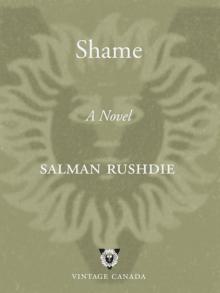 Shame
Shame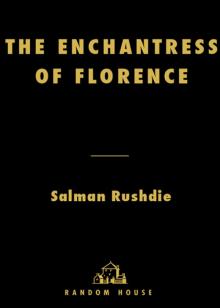 The Enchantress of Florence
The Enchantress of Florence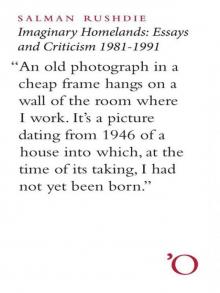 Imaginary Homelands: Essays and Criticism 1981-1991
Imaginary Homelands: Essays and Criticism 1981-1991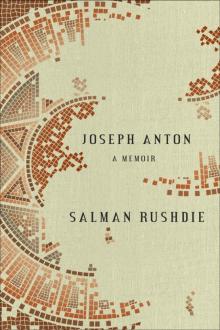 Joseph Anton: A Memoir
Joseph Anton: A Memoir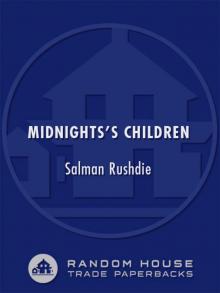 Midnight's Children
Midnight's Children East, West: Stories
East, West: Stories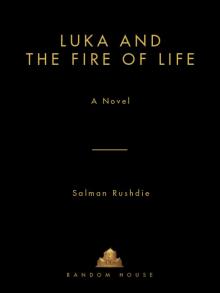 Luka and the Fire of Life
Luka and the Fire of Life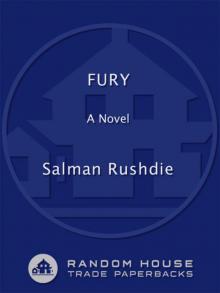 Fury Fury Fury
Fury Fury Fury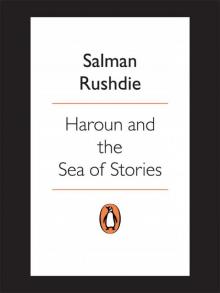 Haroun and the Sea of Stories
Haroun and the Sea of Stories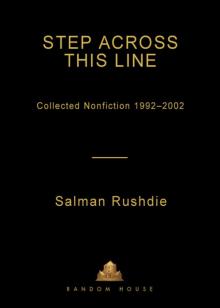 Step Across This Line: Collected Nonfiction 1992-2002
Step Across This Line: Collected Nonfiction 1992-2002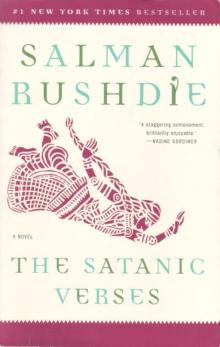 The Satanic Verses
The Satanic Verses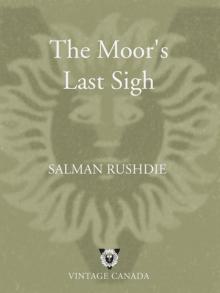 The Moor's Last Sigh
The Moor's Last Sigh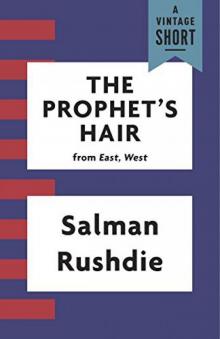 The Prophet's Hair
The Prophet's Hair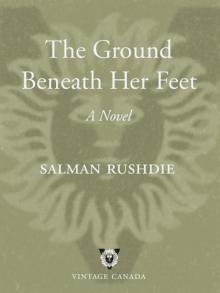 The Ground Beneath Her Feet
The Ground Beneath Her Feet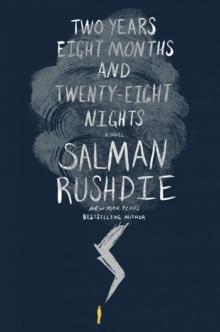 Two Years Eight Months and Twenty-Eight Nights
Two Years Eight Months and Twenty-Eight Nights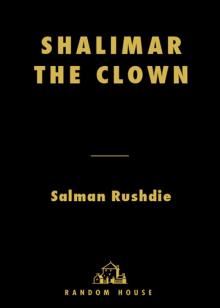 Shalimar the Clown
Shalimar the Clown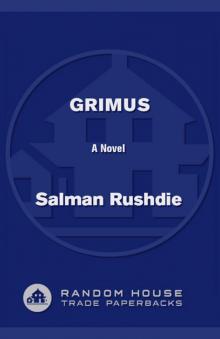 Grimus
Grimus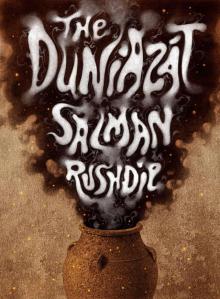 The Duniazát
The Duniazát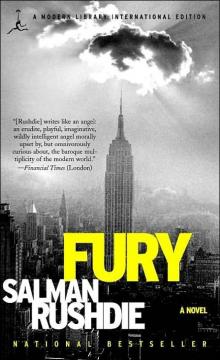 Fury
Fury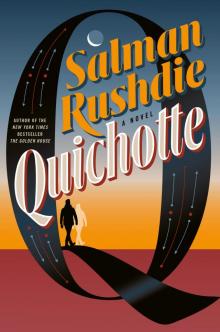 Quichotte
Quichotte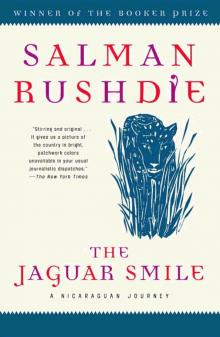 The Jaguar Smile
The Jaguar Smile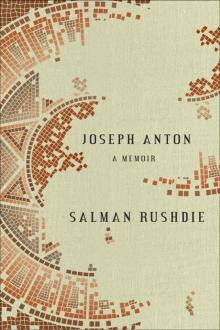 Joseph Anton
Joseph Anton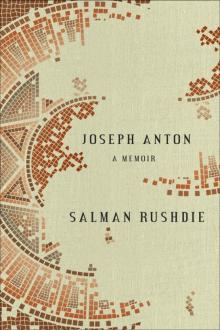 Joseph Anton: A Memoir: A Memoir
Joseph Anton: A Memoir: A Memoir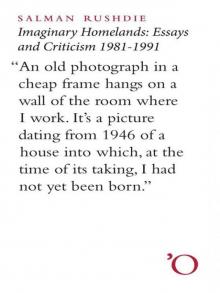 Imaginary Homelands
Imaginary Homelands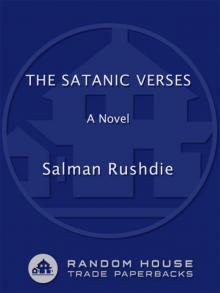 The Satanic Verses: A Novel
The Satanic Verses: A Novel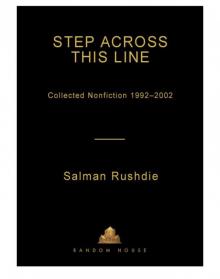 Step Across This Line
Step Across This Line East, West
East, West